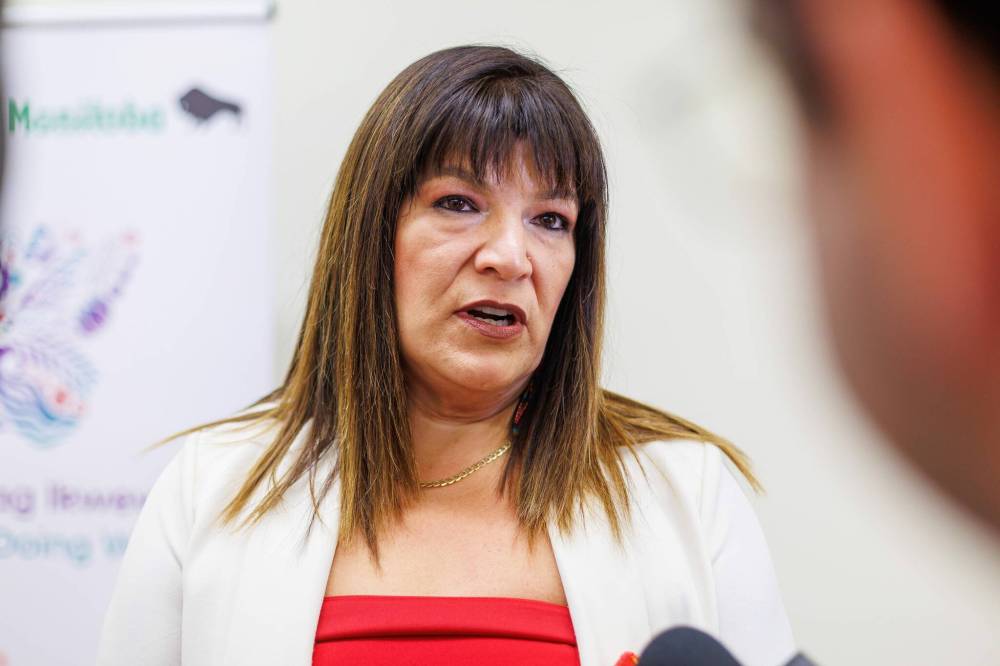NDP introduces legislation to detain people suffering from substance-caused psychosis for 72 hours
Advertisement
Read this article for free:
or
Already have an account? Log in here »
To continue reading, please subscribe:
Monthly Digital Subscription
$0 for the first 4 weeks*
- Enjoy unlimited reading on winnipegfreepress.com
- Read the E-Edition, our digital replica newspaper
- Access News Break, our award-winning app
- Play interactive puzzles
*No charge for 4 weeks then price increases to the regular rate of $19.00 plus GST every four weeks. Offer available to new and qualified returning subscribers only. Cancel any time.
Monthly Digital Subscription
$4.75/week*
- Enjoy unlimited reading on winnipegfreepress.com
- Read the E-Edition, our digital replica newspaper
- Access News Break, our award-winning app
- Play interactive puzzles
*Billed as $19 plus GST every four weeks. Cancel any time.
To continue reading, please subscribe:
Add Free Press access to your Brandon Sun subscription for only an additional
$1 for the first 4 weeks*
*Your next subscription payment will increase by $1.00 and you will be charged $16.99 plus GST for four weeks. After four weeks, your payment will increase to $23.99 plus GST every four weeks.
Read unlimited articles for free today:
or
Already have an account? Log in here »
The NDP government introduced legislation Thursday to allow the 72-hour detention of people who are high on methamphetamine and other substances.
Housing, Addictions and Homelessness Minister Bernadette Smith said Bill 48, the Protective Detention and Care of Intoxicated Persons Act, is meant to keep people safe. It would replace the Intoxicated Persons Detention Act that allows for the 24-hour involuntary detention of people intoxicated by alcohol.
“I look forward to quick passage of this bill and unanimous support from this house so that we can keep Manitobans safe and free up our police officers, take the pressure off our emergency rooms and connect people with the care that they so desperately need,” Smith said in the chamber.

MIKE DEAL / FREE PRESS
Housing, Addictions and Homelessness Minister Bernadette Smith said Bill 48, the Protective Detention and Care of Intoxicated Persons Act, is meant to keep people safe.
After question period, the minister said legislation now allows for 24-hour involuntary holds for people intoxicated by alcohol.
Police are required to either “criminalize” those intoxicated by other substances, such as methamphetamine, or take them to the hospital “where they’re waiting 10-plus hours from what we’re told by police,” said Smith, who was joined by Winnipeg Police Service Chief Gene Bowers at a news conference at the legislature.
“They’re often handcuffed to a chair or a bed for their own safety and the safety of others,” she said.
The new bill expands involuntary holds to 72 hours for drug-intoxicated people, who experts say can require two or three days to get sober.
“I think this is a great step forward,” Bowers told reporters. “Currently our members have very limited options when it comes to people suffering from meth psychosis.”
Officers take them to hospital and WPS members will spend “hours and hours and sometimes days with people who are suffering from this type of addiction,” he said, adding requests to check on a person’s well-being is the top call the police service receives and tie up a lot of resources.
Instead of charging them or waiting in hospital with them, the police will be able to take them to a “protective care centre,” the bill says.
“The main thing I think about this bill is we’re not criminalizing people,” Bowers said. “We’re keeping them in a safe place so that they’re not harming themselves or harming anyone else in the community.”
The bill’s quick passage isn’t guaranteed.
The Progressive Conservatives said Thursday that they have many unanswered questions before agreeing to its speedy passage ahead of the session’s end in November.
PC Leader Obby Khan questioned where the protective care centres for people recovering from meth psychosis will be located and if they’ll need to be built.
“Can a protective care centre be located at Health Sciences Centre?” Khan asked. “Could it be located in a (supervised) drug consumption site — where you could have somebody who is being held for up to 72 hours and then walking through a door and getting more drugs and then repeating that cycle? These are valid concerns and questions that Manitobans have.”
The Tory leader also questioned how serious the government is about the seeing the bill become law anytime soon.
“If this was a real priority for them, why did they not have any conversations with us prior to tabling this?” Khan said after question period.
“If this is a priority and you want to work together to pass this, why not sit with the other votes in the house and say, ‘How do we get this across the finish line?’”
When asked if the province is equipped to provide 72-hour involuntary detentions at facilities such as Main Street Project that now provide 24-hour detention services, Smith said the resources will be in place.
“This is taking pressures off the system but it’s also connecting people to care that they need,” she said.
carol.sanders@freepress.mb.ca

Carol Sanders
Legislature reporter
Carol Sanders is a reporter at the Free Press legislature bureau. The former general assignment reporter and copy editor joined the paper in 1997. Read more about Carol.
Every piece of reporting Carol produces is reviewed by an editing team before it is posted online or published in print — part of the Free Press‘s tradition, since 1872, of producing reliable independent journalism. Read more about Free Press’s history and mandate, and learn how our newsroom operates.
Our newsroom depends on a growing audience of readers to power our journalism. If you are not a paid reader, please consider becoming a subscriber.
Our newsroom depends on its audience of readers to power our journalism. Thank you for your support.





